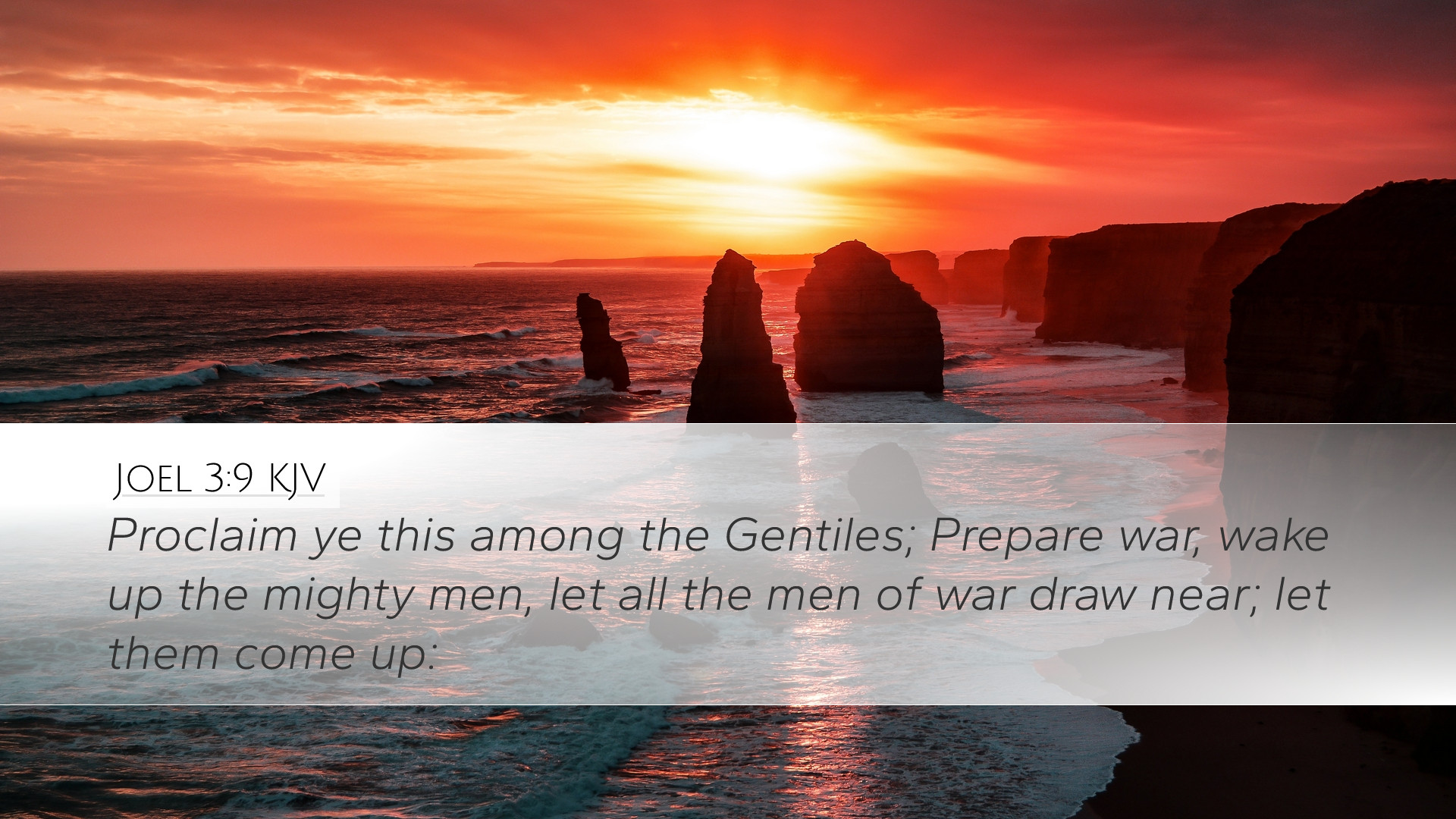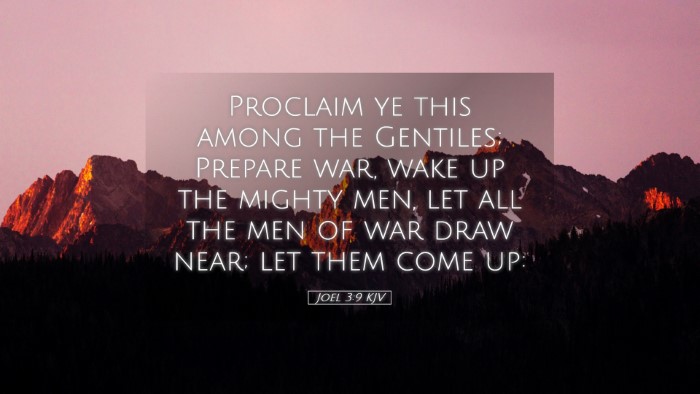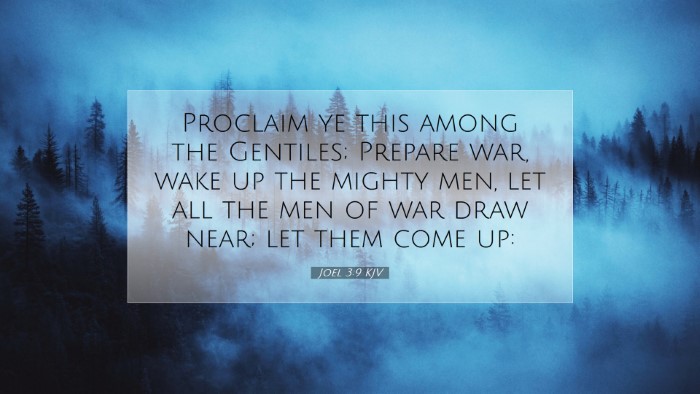Old Testament
Genesis Exodus Leviticus Numbers Deuteronomy Joshua Judges Ruth 1 Samuel 2 Samuel 1 Kings 2 Kings 1 Chronicles 2 Chronicles Ezra Nehemiah Esther Job Psalms Proverbs Ecclesiastes Song of Solomon Isaiah Jeremiah Lamentations Ezekiel Daniel Hosea Joel Amos Obadiah Jonah Micah Nahum Habakkuk Zephaniah Haggai Zechariah MalachiJoel 3:9
Joel 3:9 KJV
Proclaim ye this among the Gentiles; Prepare war, wake up the mighty men, let all the men of war draw near; let them come up:
Joel 3:9 Bible Commentary
Commentary on Joel 3:9
The verse Joel 3:9 reads: "Proclaim this among the nations: Prepare for war! Stir up the mighty men; let all the men of war draw near; let them come up." This verse carries a powerful call to arms and demands attention from pastors, theologians, and scholars. In order to deepen our understanding of this proclamation, we will examine insights from various public domain commentaries.
Historical and Prophetic Context
The Book of Joel is often considered one of the most significant prophetic books in the Old Testament, set against a backdrop of calamity and divine judgment. Joel speaks to the people of Judah during a time of national distress, primarily caused by a devastating locust plague. This locust invasion serves as a warning and a precursor to a greater day of the Lord, which would entail judgment against the nations.
Matthew Henry emphasizes that God's judgments are often communicated through various means, including nature and the actions of nations. The call to "proclaim this among the nations" is an acknowledgment that God's sovereignty extends beyond Israel; all the nations of the earth are subject to His authority. It implies that divine retribution is forthcoming not just for Judah but for all who oppose God.
The Call to Action
The exhortation to "prepare for war" serves multiple purposes. It is both a rallying cry to the people of Judah and an announcement to the surrounding nations. Albert Barnes remarks that this call can be understood in both a literal and metaphorical sense.
- Literal Sense: The literal application is directed towards the armies of the nations. The call encourages the mighty men to assemble and prepare for conflict. This implies a sense of urgency and readiness, indicating that significant events are on the horizon.
- Metaphorical Sense: As a metaphor, preparing for war suggests a spiritual readiness. It urges believers to arm themselves with faith and righteousness as they navigate turbulent times, symbolizing an internal and spiritual battle against sin and ungodly influences.
The Role of Mighty Men
The term "mighty men" invokes the image of heroes or skilled warriors. In this context, it calls upon those who are strongest in might (possibly in both military and moral character) to participate in this divine calling. Adam Clarke elaborates on the idea that these "mighty men" should not only prepare for physical combat but should also be individuals of virtue who fight for justice and righteousness. This reflects the dual themes of earthly and spiritual warfare.
The Nations Gathered
The latter part of the verse—"let all the men of war draw near; let them come up"—demonstrates an open invitation for all nations to gather. It signifies a climactic confrontation of divine proportions. Matthew Henry asserts that this call to arms is indicative of a future gathering of the nations in great conflict, expected to culminate in the Day of the Lord. In this eschatological framework, the gathering serves as both a warning and an ultimatum.
Theological Implications
The implications of this verse reach deep into theological discourses surrounding judgment, justice, and redemption. It brings forth the understanding of God's patience and His ultimate plan. As noted by Albert Barnes, God's command to prepare for war is not simply an invitation for conflict but a declaration of justice that must be executed as per His divine will.
The Importance of Proclamation
The act of proclamation is significant and reflects God’s desire for all nations to be informed of His impending judgment. The messenger's role is crucial here, as one who must echo God's urgency to all. Adam Clarke underscores that the proclamation serves both as a warning of wrath and an invitation to genuine repentance before God.
Contemporary Application
In modern Christian communities, the call to "prepare for war" can resonate differently. It may be perceived as a call to engage socially, spiritually, and morally in their communities. Pastors and church leaders can interpret this as a challenge to arm their congregations not with violence, but with the Word of God and the spirit of reconciliation and justice.
Conclusion
Joel 3:9 encapsulates a profound and multifaceted call to action that reverberates through time. By understanding the context and implications of this verse, students, pastors, and theologians can better appreciate God's sovereign plan in both judgment and mercy. Through this unified understanding, believers can be empowered to face their spiritual battles with courage and hope, as they proclaim the truth to the nations.


